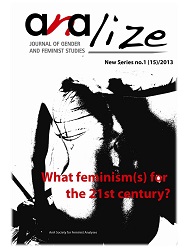Post-communist Romanian Feminism and Gender Equality. Between stereotypes, conceptual ambiguities and thinking outside the box
Post-communist Romanian Feminism and Gender Equality. Between stereotypes, conceptual ambiguities and thinking outside the box
Author(s): Alina HurubeanSubject(s): Gender Studies, Media studies, Gender history, Post-Communist Transformation
Published by: Societatea de Analize Feministe AnA
Keywords: Romanian feminism; gender relations; stereotypes; communication;
Summary/Abstract: In this article I intend to carry out a critical exercise relative to Romanian feminism and the concepts with which some of its representatives or their opponents operate. By this approach I do not claim to put in order the natural diversity and the dynamics of social representations, but I attempt to establish this practice of a constant critical (self) examination of the meanings with which we operate, of the principles that we support, and of the theoretical options available at a given moment. This article aims to bring attention to certain clichés, theoretical and semantic distortions that are frequently encountered in various communication contexts (in daily life but also in professional or specialized public communication: within projects devoted to this topic, within educational establishments, disciplines, programs of study etc.) concerning the themes of feminism, of equality in gender relations, of femininity/masculinity, and other correlated concepts (discrimination, gender inequalities, differences between sexes, and so on). These conceptual confusions or ambiguities have a twofold negative effect: on the one hand, they affect/denature the correct reception (in the sense of nuanced, documented, and grounded understanding) of feminism in this country, producing reactions of a priori rejection of feminism/gender equality and, on the other, they distort, reduce or even annul the expected results of projected social action and intervention (through programs of information, education, and public policies) as well as the development of a strong feminist movement. This paper seeks to argue answers to some questions: Which are the most common stereotypes and clichés that are operating in the collective mindset and how they preserve the patriarchal model of gender relations? What kind of feminism and gender equality that would be needed today in Romania? What are the opportunities and the means of action needed in order for gender equality to be naturally assimilated in the Romanian collective mindset, deprived of many of prejudices and stereotypes?
Journal: AnALize: Revista de studii feministe
- Issue Year: 2013
- Issue No: 1 (15)
- Page Range: 79-94
- Page Count: 18
- Language: English

